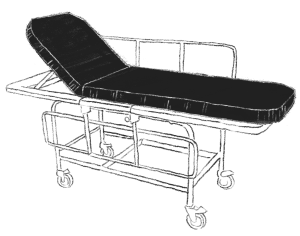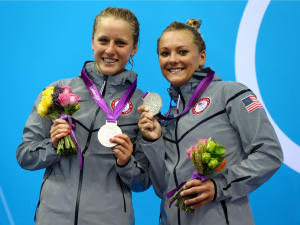It doesn’t matter who you are: the true ‘light bulb’ moments in life can strike at any time, anywhere.
For Abigail Johnston McGrath—an Olympic diver turned aspiring emergency physician—one flicked on over chicken nuggets and fries at an all-hours McDonalds in London. It was 2012. Just days before, she had won a silver medal in synchronized diving.
Though few fellow doctors can retell a similar med school origin story, most will recognize the same elements that characterized their own journey; those of dedication, time management, and the need for a non-medical pressure release valve.
The second great dream of Dr. Johnston McGrath’s life will be realized when she becomes an emergency medicine attending physician in Durham, North Carolina this summer. The first was in progress before she sat down next to rower Genevra ‘Gevvy’ Stone in London, and eventually saw her compete in two Olympics.
Though that world, along with the pressure of juggling med school and an athletic career are behind her now, evidence of lessons learned remain. She’s willing to share a little of it, too.
“It was certainly a challenge, but I wouldn’t have even thought it was possible if I hadn’t met Gevvy over some chicken nuggets and fries,” she says, over a video interview.
I. Approach and take-off
It is hard to know what came first for ‘Abby’ Johnston McGrath; her aspirations of becoming a doctor, or an Olympian.

A life-long asthmatic, her childhood in Columbus, Ohio featured regular doctor and emergency visits. The experience left her fascinated by medicine as well as the idea of being able to help people get better.
During the same childhood, the 1996 Olympics was held in Atlanta. Popularly known as the ‘Magnificent Seven,’ the United States women’s gymnastics team won gold, and nationwide fame. Then six, Johnston McGrath remembers setting her heart on sport’s ultimate prize.
“I was just so inspired,” the 31-year-old says, “and, at that point, I just told my parents ‘I’m going to go to the Olympics.
“That passion and that fire to achieve that goal just stuck with me. I originally was a gymnast before switching over to diving, and realized that—as I went up the ranks and was on the national team—this dream that I’d had since I was a little girl could come true.”
Johnston McGrath received a diving scholarship to Duke University in 2007, where she studied psychology. Medicine was still on her mind, but she assumed that juggling med school and diving would just be too much.
After missing out on selection in the 2008 Olympic trials, she made the U.S. diving team four years later, partnering with Illinoian Kelci Bryant in the synchronized three-meter springboard.
Though ultimately bested by the star Chinese pairing in London, Johnston McGrath and Bryant beat out the more fancied nations in their podium finish.
“We were dark horses for getting on the podium,” Johnston McGrath says. “No one really expected us to be there, although we had been consistently competing at a high level, internationally.
“The whole experience played out like a fairy tale dream – it played out as I had hoped. We had our best performance on the day that counted, and ended up on the podium with the silver medal around my neck.”
Gold seemed to follow, days later. After getting an order from the Olympic athlete’s McDonalds, she sat down outside next to another young woman wearing a ‘USA’ jacket.
It was Boston’s Genevra Stone, a Princeton-educated single sculls rower in her second year at Tufts University School of Medicine. She’d later win Olympic silver in Rio, while in the second year of an emergency medicine residency.
The pair started chatting. Before long, Johnston McGrath knew she’d found the perfect person to ask the questions that had been bugging her for years.
The whole experience played out like a fairy tale dream – it played out as I had hoped. We had our best performance on the day that counted, and ended up on the podium with the silver medal around my neck.
“I don’t remember how it came up,” Stone told ESPN about their McDonalds meet-up, in 2015, “but once it did, [Johnston McGrath] got pretty excited because she was pre-med at Duke. I told her, at least in rowing, I definitely had time to train during the first and second years. Starting medical school didn’t necessarily mean an end to the athletic career.”
“It was this lightbulb moment for me,” Johnston McGrath says. “[I thought] maybe I can do medicine and continue to train.” She took her MCATs the following year, securing a spot at Duke University School of Medicine.
II. Free position, and entry
With the Rio de Janeiro Games looming ahead, Johnston McGrath’s first-year medical classes started in 2014. After being at the top of the sporting world only two years before, she felt as out of place as a diver at a track meet.
“Med school was particularly tough because I went from being someone who was at the top of the world, in my field, to being a learner again,” she says. “That was a humbling challenge for me, knowing that there was so much I didn’t know and so much I had to learn.”
With second-year rotations scheduled to fall smack bang in the middle of the Rio Games, Johnston McGrath asked Duke if she could swap her second and third years around. With second-year rotations pushed back a year, the diver would have the flexibility to prepare for the Olympics.

The school allowed it, and the die was cast. During her second year, Johnston McGrath would train up to four hours a day, six times a week, along with six hours every day dedicated to studying, and a research project.
With a U.S. Olympic Committee stipend unable to cover her rent and cost of living while preparing for the Games and her student loan debt building, juggling both was the only option for Johnston McGrath.
“It’s certainly two grueling careers to be managing at the same time,” she says. “It meant that I’d get up early, go to practice, and then I would run from practice across campus to the medical center to go to my classes with wet hair and sometimes in my workout clothes.
“I’d do classes through the morning and run back to the pool to practice in the afternoon. Fortunately, my coach was really flexible, which meant I could practice with different groups throughout the day.
“The medical school also worked with me so I could go to competitions, but there were times where I was studying as I was walking across campus, hoping I wouldn’t run or bump into anything as I was going. It took a lot of time management to make it work.”
 It paid off, with Johnston McGrath qualifying in the individual three-meter springboard for Rio in 2016. After shining in the preliminary (sixth) and semi-final (fifth) rounds of competition, Johnston made the final, finishing 12th.
It paid off, with Johnston McGrath qualifying in the individual three-meter springboard for Rio in 2016. After shining in the preliminary (sixth) and semi-final (fifth) rounds of competition, Johnston made the final, finishing 12th.
Two days later, she was back in Durham, North Carolina, starting her first rotation in psychiatry. After graduation in 2018, Johnston McGrath entered her emergency medicine residency at Duke University Hospital, where she weathered the Covid-19 storm last year.
“I think athletics has a lot of parallels to medicine,” she says. “There’s a lot of teamwork of course, especially in the emergency department. You’re working with techs, nurses, and [the] pharmacy to try and address the problem.
“I also think being in the emergency room is a bit of an adrenaline rush just like competitions. You don’t know what is coming through the door, and you have to make a game plan before the person gets there. You know; what supplies do we need? What support do we need? What other residents or trauma team members need to be present?
“I think that, for me, it gives me that adrenaline rush that I once thrived off in athletics. Time management is a huge thing and learning how to multitask. That was something I worked hard at and mastered throughout my athletic career, and was able to translate into my medical career.”
III. Degree of difficulty
Though armed with the focus and determination to claim an Olympic diving medal, Johnston McGrath freely admits how difficult med school was for her. It was in the continued presence of physical activity—and purposeful time away from her studies—that she says she found her way to deal with it all.
“For me, continuing to dive was great for my mental health,” she says. “It was great to get away from med school. I was able to get back to the pool and focus on being physically active and put my studies aside for a set amount of time every time. That was really helpful for me.
“The rigor of med school and course work meant that I didn’t really have much time to slack off, so I learnt to use my time wisely when I wasn’t in the pool or in the classroom for study purposes. I think they complimented each other really nicely, just because one was a break from the other.

“There were certainly times, like studying for USMLE Step 1, when I was at my breaking point for a few weeks where I was literally studying morning to night, hoping to squeeze in some practice time in-between. They were probably the most challenging times.”
This summer, Johnston McGrath will start as an attending emergency medicine physician at Duke University Hospital. Tokyo Olympics will fill television screens at the same hospital, around the same time.
Nine years after their chance fast food encounter in London, ‘Gevvy’ Stone will be back at the Olympics again this year. Still juggling medicine and sport, Stone was recently named in the U.S. rowing squad for the Games.
Gymnast Amy Chow—arguably the ‘Seven’s biggest star—went on to study medicine at Stanford. Chow maintains a private practice in Palo Alto, California, today. Like her childhood hero, Johnston McGrath is happy being far from the Olympic lure.
“Med school was particularly tough because I went from being someone who was at the top of the world, in my field, to being a learner again.”

Technically called a ‘5152B’, her final competitive dive in Rio featured a full twist with two and a half flips. For short, divers call it a ‘full out’.
“Sometimes when I look back on my athletic career, it feels like yesterday but also a lifetime ago,” she says.
“I’m in a different place now. I go to the hospital seven times a week for work. I have a husband and two young children. My day-to-day is quite different, but there are so many lessons I learned from athletics that I still apply on a regular basis.
“I use the tools I learned from athletics and the confidence I gained from becoming one of the world’s best athletes and that helps fuel my new career path: my medical career.”



